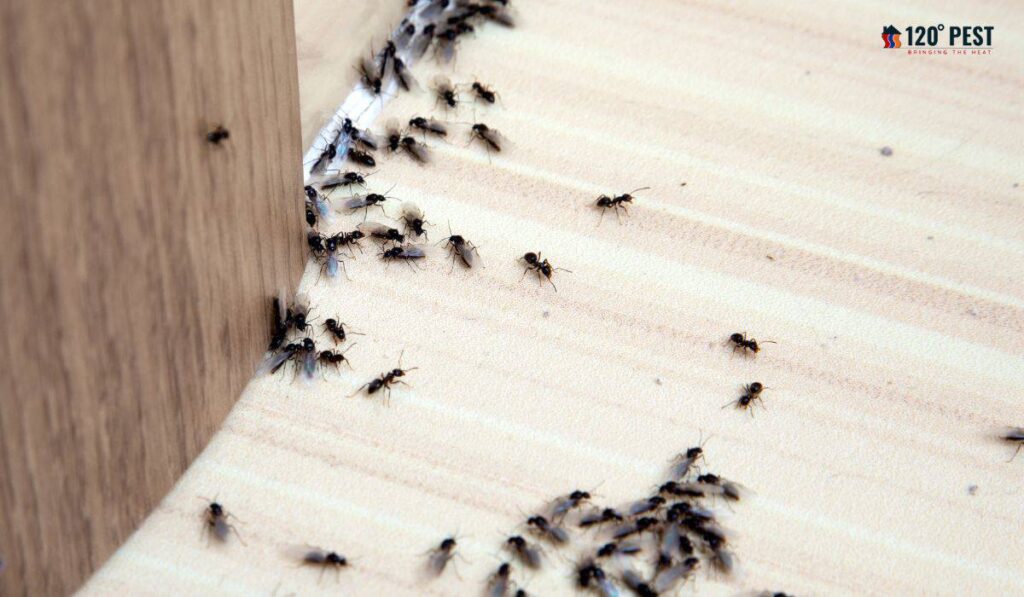Pest control is necessary for maintaining a healthy and comfortable living or working space.
The quarterly approach to pest control has gained traction due to its proactive nature in preventing infestations before they become unmanageable.
While many generic solutions exist, local methods tailored to specific regional pests and environments often prove the most effective.
Solution 1: Professional Pest Control Services
Professional pest control services offer expertise that takes work to match.
Local pest control companies specialize in understanding the unique pest challenges of their area.
They leverage this knowledge to deliver tailored solutions encompassing prevalent pests each season.
These professionals also employ environmentally friendly products and methods, ensuring the safety of both occupants and the ecosystem.
For instance, in coastal areas, pest control services focus more on preventing termite infestations due to the humid climate, whereas in rural areas, rodent control could take precedence.
Solution 2: Integrated Pest Management (IPM) Techniques
Integrated Pest Management (IPM) strategies involve a holistic approach to pest control.
Rather than relying solely on chemicals, IPM emphasizes prevention, monitoring, and power through a combination of methods.
This approach is often adopted by local communities or organizations that aim for sustainable and long-term pest management.
In regions with diverse ecosystems, such as mountainous areas or wetlands, local IPM strategies include using natural predators or beneficial insects to control pests and reducing reliance on pesticides.
For instance, introducing ladybugs to control aphids in gardens or implementing trap crops to divert problems away from valuable plants are prevalent techniques.

Solution 3: Natural Remedies and DIY Pest Control
Many communities rely on natural remedies and do-it-yourself (DIY) pest control methods that have been passed down through generations.
These solutions often use everyday household items and natural substances to repel or eliminate pests.
For example, peppermint oil or vinegar sprays deter ants, while diatomaceous earth is effective against crawling insects like cockroaches.
Local experts frequently advocate for these methods due to their minimal environmental impact.
Farmers might use garlic or chili pepper sprays in regions with agricultural significance to protect crops from pests without using chemical pesticides.
Solution 4: Community Engagement and Education
Engaging communities in pest control efforts is pivotal for long-term success.
Local initiatives, workshops, or educational programs are crucial in raising awareness and educating residents about preventive measures.
Community involvement fosters a sense of responsibility and collective action, leading to more effective pest control outcomes.
In suburban neighborhoods, community gardens often serve as educational platforms where residents learn about natural pest control methods while actively participating in maintaining a pest-resistant environment.
Moreover, neighborhood associations frequently organize seminars where experts share insights on managing local pests sustainably.
Solution 5: Regional Pest-Specific Approaches
Certain regions face unique pest challenges that demand specialized solutions.
For example, tropical climates might battle mosquito-borne diseases, leading to extensive mosquito control programs involving habitat management and larval control.
In agricultural areas, crop rotation and diversification are standard practices to mitigate pest damage without solely relying on pesticides.

Local universities and agricultural extension services often play a pivotal role in disseminating knowledge about these region-specific approaches.
Conclusion
Quarterly pest control isn’t just about eradicating pests—it’s about fostering a harmonious environment where humans and nature coexist.
Local solutions cater to the specific needs of each region, offering a more targeted and practical approach to pest management.
By embracing these solutions and engaging in community efforts, individuals can proactively ensure a pest-free environment while preserving the delicate balance of ecosystems.
Ready to take the first step in safeguarding your space from pests?
Contact 120Pest at https://120pest.com/contact/ to explore tailored quarterly pest control solutions that suit your locality.
Let’s create a pest-free environment that promotes health, safety, and sustainability for all.
FAQs
What is Quarterly Pest Control?
Quarterly pest control involves scheduled treatments every three months to proactively prevent and manage common pests. It aims to maintain a pest-free environment year-round.
Why is Quarterly Pest Control Necessary?
Regular pest control helps prevent infestations by targeting pests before they become a significant problem. It’s a proactive approach to maintaining a healthy living or working space.
Are Quarterly Pest Control Treatments Safe for Pets and Children?
Professional quarterly pest control treatments use safe and approved products when conducted by certified technicians. Technicians take precautions to ensure the safety of pets and children during and after treatments.
How Long Does Quarterly Pest Control Treatment Last?
The effectiveness of quarterly pest control treatments varies depending on the pest, treatment method, and environmental factors. Typically, treatments last for several weeks to a few months, requiring periodic follow-ups.
Will Quarterly Pest Control Treatments Harm Beneficial Insects?
Professional pest control services use targeted treatments to minimize harm to beneficial insects. They employ methods that specifically target pests while preserving valuable species.
Do I Need Quarterly Pest Control Even If I Haven’t Noticed Pests?
Yes, preventive measures are crucial even if no signs of pests exist. Regular treatments create a barrier against potential infestations, ensuring a pest-free environment.
Can I Do Quarterly Pest Control Myself?
While DIY methods exist, professional quarterly pest control services are recommended for comprehensive and effective results. They have the expertise, equipment, and knowledge to handle various pest scenarios.
What Pests Are Typically Addressed in Quarterly Pest Control Treatments?
Quarterly pest control treatments target many pests, including ants, spiders, rodents, termites, cockroaches, mosquitoes, and other common household pests prevalent in specific regions.
Are Quarterly Pest Control Services Environmentally Friendly?
Many pest control companies now offer environmentally friendly options, utilizing eco-friendly products and methods to minimize their environmental impact.
How Can I Prepare for Quarterly Pest Control Treatments?
Preparation often involves simple tasks such as clearing clutter, sealing entry points, and ensuring access to treatment areas. Your pest control provider will provide specific instructions before treatment.




